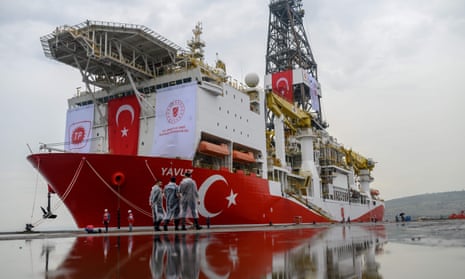EU leaders have agreed to impose sanctions on an unspecified number of Turkish officials and entities involved in gas drilling in Cypriot-claimed waters – but they deferred bigger decisions such as trade tariffs or an arms embargo until they have consulted with the upcoming Biden administration.
The decision reached by the EU council after hours of heated debate disappointed hardliners such as France, Cyprus and Greece, which had pressed for more urgent and substantive action to express EU disapproval of Turkish foreign policy.
Nevertheless, the Turkish ministry of foreign affairs responded: “We reject the biased and unlawful attitude which had to be inserted into the 10 December EU summit conclusions after the pressure of solidarity and veto.”
The foreign ministry added that the decisions reached in the EU leaders’ summit were “unlawful” and “once again ignored Turkish Cyriot people, who are co-owners of the island of Cyprus”.
The names of those facing sanctions will be published in the next few weeks by the EU foreign affairs chief, Josep Borrell. He has also agreed to prepare proposals on a broader approach to Turkey by March, giving the EU time to consult Joe Biden’s national security team.
The US president-elect has called Turkish president Recep Tayyip Erdoğan an autocrat, but Ankara has tried to avoid antagonising the incoming administration.
“It is very clear what is at stake here: the credibility of the European Union,” the Greek prime minister, Kyriakos Mitsotakis, said before the summit. Greek diplomats did little to disguise their disappointment.
France and Greece argued that the EU in October had already agreed it would impose sanctions if the Ankara regime did not stop its “provocations” and “aggressive rhetoric”.
Turkey has been using the Oruç Reis research vessel in Greek waters, then returning it to Turkish ports when the diplomatic heat from Germany required it to do so.
Germany insisted on keeping the door open to Turkish cooperation and ensured the EU statement offered a hand of friendship if Turkey reciprocated, and provided sustained de-escalation, including a willingness to settle disputes through dialogue and in line with international law.
It also suggests a multilateral conference on the future of the eastern Mediterranean, something Turkey would like because it feels unfairly excluded from some regional energy forums.
Turkey is locked in various disputes with the EU, including claims to drilling rights in Cyprus and a wider disagreement over the way maritime borders are drawn across the seas.
France and Turkey are also at loggerheads in Libya, where Erdoğan has sent arms and troops to help the Tripoli government in the west, an administration viewed by some in Paris as a front for the Muslim Brotherhood.
Turkey’s leading role in Nato is also causing concern in some quarters. The invasion of north-east Syria and the acquisition of S-400 missiles from Russia discomforts France but the Nato secretary general, Jens Stoltenberg, has described Turkey as an important ally.
Additional reporting by Bethan McKernan
